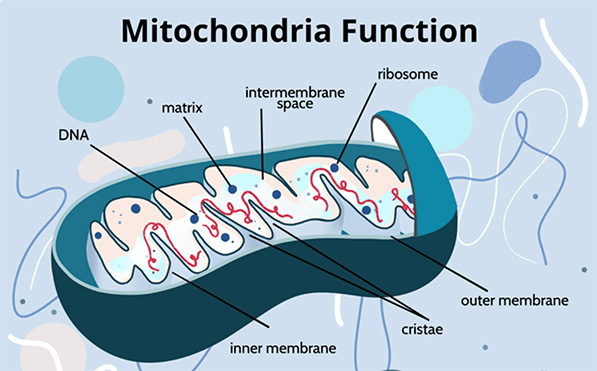Mitochondria, often referred to as the powerhouses of the cell, play a crucial role in your health and ageing process. These tiny organelles are responsible for producing the energy that your cells need to function effectively. But did you know that maintaining healthy mitochondria is essential not only for healthy ageing, but also for how well your body and mind operate, from boosting your energy levels to supporting your mental health?
In this comprehensive guide, we’ll explore how your mitochondrial health influences other areas of your health and how you can support your mitochondrial function with 7 natural strategies grounded in the principles of Functional medicine.
The majority of the body’s energy, approximately 90%, is produced by mitochondria in the form of ATP via TCA cycle and the electron transport chain (ETC).
How Do Mitochondria Impact Our Health?
The primary function of mitochondria is to generate adenosine triphosphate (ATP), the primary energy currency of the cell, through oxidative phosphorylation. This process, known as cellular respiration, involves converting nutrients from the food we eat into usable energy, and is vital for the survival and function of almost all cell types.
Mitochondria also play a significant role in regulating the metabolic activity of cells, which impacts the body’s metabolism and energy levels. When mitochondria are healthy, they support robust cellular function and overall health.
Conversely, when they become dysfunctional, it can lead to a host of health problems, with mounting research pointing to a strong link between mitochondrial dysfunction and various chronic diseases.

How To Recognise Symptoms of Mitochondrial Dysfunction
If your mitochondria aren’t functioning optimally, you may experience a range of symptoms such as:
- Chronic fatigue: Persistent, unexplained tiredness
- Endocrine disorders: Diabetes, thyroid problems
- Gastrointestinal problems: Nausea, vomiting, diarrhoea
- Muscle issues: Weakness, pain, cramps
- Neurological issues: Brain fog, memory problems, headaches, seizures
How Do Mitochondria Impact Ageing and Cognitive Decline?
Mitochondrial function naturally declines as you age, leading to a decrease in cellular energy production and an increase in oxidative damage.
When mitochondria generate energy, they produce a reactive oxygen species (ROS) as a byproduct. Over time, the accumulation of ROS leads to oxidative damage, particularly to mitochondrial DNA (mtDNA). Unlike nuclear DNA, mtDNA lacks robust repair mechanisms, making it more susceptible to damage. This damage impairs the mitochondria’s ability to produce ATP, resulting in decreased cellular energy and efficiency.
The increase in oxidative damage contributes significantly to the ageing process. Damaged mitochondria become less efficient, leading to a vicious cycle of increased ROS production and further mitochondrial damage. This process is associated with several age-related conditions, including cardiovascular disease, neurodegenerative disorders like Alzheimer’s and Parkinson’s, and metabolic diseases such as type 2 diabetes.
How Does Mitochondria Dysfunction Affect Mental Health?
Due to the high energy demands of the brain, mitochondria are abundant in brain cells. They provide the ATP necessary for synaptic function, neurotransmitter synthesis, and cellular homeostasis; your cell’s ability to maintain the stable internal conditions necessary for optimal function and survival despite external changes.
Healthy mitochondrial function is also crucial for neuroplasticity, which is your brain’s ability to adapt and form new neural connections in response to learning and experience.
Emerging research is increasingly highlighting the critical connection between mitochondrial health and mental well-being with mitochondrial dysfunction being linked to depression. Impaired energy production in neurons can affect neurotransmitter balance, particularly serotonin, dopamine, and norepinephrine, which are crucial for mood regulation. Oxidative stress and inflammation resulting from mitochondrial dysfunction also further contribute to depressive symptoms.
Additionally, anxiety disorders have also been associated with mitochondrial dysfunction. Chronic stress, a common factor in anxiety, leads to excessive production of reactive oxygen species (ROS), damaging mitochondria and impairing their function. This can disrupt neural communication and exacerbate anxiety symptoms.
Oxidative stress associated with mitochondrial damage has been postulated to play a role in the pathogenesis of neuropsychiatric disorders, particularly depression and dementia.

How Do Toxins Affect Mitochondrial Function?
Environmental toxins pose a significant threat to mitochondria by disrupting their function. Heavy metals like lead, mercury, cadmium and chromium that can be found in certain foods and household items such as e-cigarettes and cleaning products, as well as certain chemicals found in pesticides, plastics, and industrial pollutants, can disrupt mitochondrial function and energy production. Using or consuming products containing these toxins can lead to oxidative stress, damages mitochondrial DNA and impairing their ability to produce ATP efficiently.
Heavy Metals
Heavy metals accumulate in the body over time and can severely impact mitochondrial function. Lead exposure, for instance, has been linked to decreased mitochondrial respiration and increased oxidative stress.
Mercury interferes with mitochondrial enzymes, disrupting the electron transport chain and reducing ATP production.
Cadmium exposure can lead to mitochondrial dysfunction by promoting oxidative damage and impairing mitochondrial biogenesis.
Chemical Toxins
Pesticides and herbicides, commonly used in conventional agriculture to produce a lot of the food you find in supermarkets can also damage mitochondria. Chemicals like glyphosate have been shown to disrupt the function of mitochondrial enzymes and induce oxidative stress.
Similarly, industrial chemicals such as phthalates and bisphenol A (BPA), often found in plastics such as those used for food and drink packaging or grocery bags, can interfere with mitochondrial function and hormone regulation.

Pharmaceuticals
Despite the efficacy of pharmaceutical drugs such as statins and antibiotics at combating illness and managing symptoms, emerging evidence suggests that these also cause impairment of mitochondrial function and eventual mitochondrial dysfunction as a side effect.
This mitochondrial “collateral damage” can contribute to the development of chronic diseases and accelerate the aging process.
Recent studies suggest that statins, while effective at lowering cholesterol, can also inhibit the production of Coenzyme Q10 (CoQ10), a vital component in the mitochondrial electron transport chain. This inhibition can lead to reduced ATP production and increased oxidative stress, which can damage cells and tissues over time.
Book a Free Discovery Call
Discuss your health concerns with one of our expert practitioners and find out how functional medicine can get your health back on track.
How To Protect and Improve Mitochondrial Health: Functional Medicine Strategies
Whether you are looking to resolve a health condition, prevent the on-set of mitochondrial-related illness or simply wanting to naturally support your health and ageing process, Functional medicine offers an effective and personalised approach.
Advanced testing can identify specific deficiencies and imbalances, allowing for tailored interventions such as targeted nutrition, lifestyle modifications, and supplement protocols.
1. Diet & Nutrition
Functional medicine practitioners thoroughly assess your diet to understand how nutrition may be affecting your health, then make personalised diet recommendations accordingly.
A balanced diet rich in nutrients and antioxidants can help protect mitochondria from oxidative stress and enhance mitochondrial function. Supplements containing these compounds can also be a big benefit to your cells:
- Antioxidants: Foods high in antioxidants, such as berries, dark chocolate, and green leafy vegetables, help protect mitochondria from oxidative stress.
- B Vitamins: Particularly B1, B2, B3, B5, and B12, are critical for energy metabolism. Sources include leafy greens, nuts, and seeds.
- CoQ10: A critical component of the electron transport chain that is essential for ATP production. Found in organ meats, fatty fish, and whole grains.
- Magnesium: Vital for over 300 biochemical reactions, including energy production, magnesium-rich foods include nuts, seeds, and whole grains.
To find out more about personalised nutritional therapy, visit our How It Works page and book a free 15-minute Discovery Call with one of our expert practitioners to discuss your health concerns and goals.

2. Supplements & Enzymes
Supplement protocols are often an important component of a personalised nutritional therapy strategy, helping to support areas of your diet where there is nutritient or vitamin deficiency. There are several supplements that can help enhance mitochondrial function:
- Acetyl-L carnitine: Helps transport fatty acids into mitochondria for energy production
- Alpha-lipoic acid: Acts as a potent antioxidant
- COQ10: in supplement form
- NAD+: supports energy production and cellular repair
- PQQ: promotes mitochondrial biogenesis

3. Intermittent Fasting
Intermittent fasting (IF) offers numerous benefits for mitochondrial health, supporting enhanced energy production and overall cellular function:
- Boosts Insulin Sensitivity: Improved insulin sensitivity from IF regulates blood sugar levels more effectively, reducing metabolic strain on mitochondria and promoting optimal function.
- Enhances Mitochondrial Biogenesis: IF stimulates mitochondrial biogenesis by activating signalling molecules like PGC-1α and AMPK, which promote the formation of new mitochondria.
- Improves Metabolic Flexibility: During fasting, the body switches from using glucose to fatty acids and ketones for energy, reducing reactive oxygen species (ROS) production. This shift protects mitochondria from oxidative damage and improves their function.
- Increases Production of Key Molecules: Fasting boosts the production of sirtuins, NAD+, and ketones, all of which support mitochondrial function and energy production.
- Promotes Autophagy: This is the body’s process of cleaning out damaged cells and regenerating new ones. This helps remove dysfunctional mitochondria, reducing oxidative stress and maintaining a healthy mitochondrial population.
- Reduces Inflammation & Oxidative Stress: IF lowers systemic inflammation and oxidative stress, creating a more favorable environment for mitochondrial health. This protection helps maintain mitochondrial DNA and protein integrity.
Popular IF methods include the 16/8 method (16 hours fasting, 8 hours eating), the 5:2 method (normal eating for five days, reduced calorie intake for two days), and alternate-day fasting.
4. Support Your Gut Microbiome
A healthy gut microbiome significantly supports mitochondrial function. Beneficial gut bacteria produce short-chain fatty acids (SCFAs) like butyrate, which enhance mitochondrial efficiency and biogenesis. A balanced microbiome also regulates inflammation and reduces oxidative stress, protecting mitochondria from damage.
Additionally, a healthy gut improves the absorption of essential nutrients like B vitamins and CoQ10, crucial for mitochondrial energy production.
Incorporating both probiotics and prebiotics into your diet supports a healthy gut microbiome, which in turn enhances mitochondrial function, energy production, and overall well-being.

5. Exercise
Regular physical activity stimulates mitochondrial biogenesis, the process by which new mitochondria are formed.
Aerobic exercises, like running and swimming, and resistance training can enhance mitochondrial efficiency and increase their numbers, improving overall energy production and stamina.
6. Detoxification
Reducing exposure to environmental toxins and supporting the body’s natural detoxification processes can help protect mitochondria. This includes:
- Avoid Plastic Containers: Plastics can leach harmful chemicals like BPA and phthalates into your food and drinks. Use glass, stainless steel, or silicone containers instead.
- Avoid Processed Foods: Instead opt for organic produce grown without synthetic pesticides to reduce your intake of these harmful chemicals.
- Consider a Detox Program: Incorporate a short-term detox protocol guided by a healthcare professional to cleanse and reboot your system. Get in touch with us to learn more about our Detox Programme.
- Filter Your Water: Tap water can contain various contaminants, including heavy metals and chlorine. A high-quality water filter can remove these toxins and improve the safety of your drinking water.
- Use Natural Cleaning Products: Many conventional cleaning products contain harsh chemicals that can affect mitochondrial function. Natural alternatives, such as vinegar, baking soda, and essential oils, are safer for both you and the environment.
7. Adequate Sleep & Stress Management
- Adequate Sleep: Quality sleep is essential for mitochondrial repair and regeneration. Aim for 7-8 hours of sleep per night and establish a regular sleep routine to optimise mitochondrial health. Avoid using your phone and other devices for the first hour after you wake up, as well as during the last hour of your day before you go to sleep.
- Chronic Stress: Negatively impacts mitochondrial function. Practices like mindfulness, meditation, and adequate sleep are crucial for maintaining mitochondrial health. No matter how busy your schedule is, always try and create some quiet time and space for yourself throughout the day.
Book a Free Discovery Call
Speak to one of our trusted practitioners to find out how we can help you boost your mitochondrial health and prevent disease.

YOUR HEALTH. YOUR CHOICE.
Mitochondria are central to your health and longevity. Understanding their role and taking proactive steps to support their function can lead to significant improvements in your overall health, energy levels, and how you age.
At Nutrition Diets, our functional medicine approach considers your unique genetic makeup, diet, environmental exposures, lifestyle factors, and health history:
1) Expert one-to-one therapy
2) Personalised nutrition and lifestyle plans
3) Easy, at-home functional testing
We offer thorough clinical assessment and therapy via convenient online consultations. Getting started is simple and free so why not take charge of your health today with our science-based strategies?
